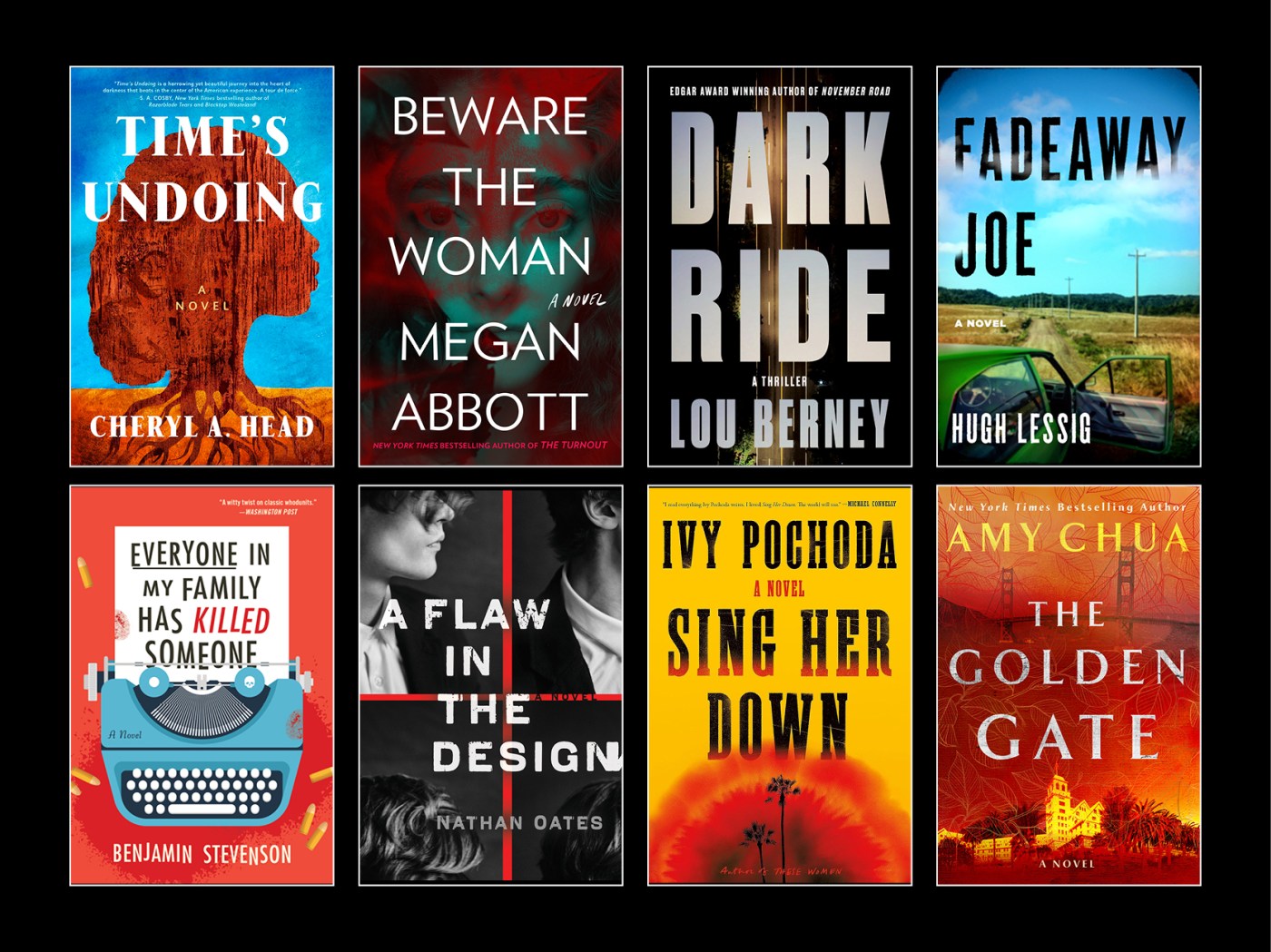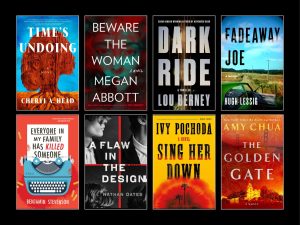
Our critic’s picks: Best mystery fiction books of 2023
Compiling the annual favorite mysteries of the year is a labor of love, and a true labor that begins with the first novel of the year. Annually, it becomes harder to narrow down the list from the 120 or so mysteries I read during the year. And 2023 was another banner year. Major trends in the genre continue to be diversity, regional stories, veterans and domestic suspense.
Happy reading.
Ivy Pochoda’s decidedly noir novels excavate a part of Los Angeles most people would prefer to ignore — the homeless camps, the run-down motels, the bits of sidewalks and alleys where someone has carved a home of sorts. She peoples this landscape with women on the margins who are plunged into one chaotic situation after another. A bleak setting to be sure, but brilliantly explored as Pochoda burrows deep into her characters’ psyches. “Sing Her Down,” Pochoda’s tour de force, looks at the rage women may carry, why a person — in these cases women — would abandon a comfortable, middle-class living for crime and violence. Pochoda sifts through myriad literary tropes, including allusions to Macbeth, mythology, even a bit of a Greek chorus while not losing sight that “Sing Her Down” is a crime novel.
In the standalone “Time’s Undoing,” Cheryl A. Head melds a contemporary story with the historical as a Detroit reporter covering the Black Lives Matter movement looks at her own family history going back to 1929 when her great-grandfather was murdered by a white cop in Birmingham, Ala. Head skillfully shows how the past can loom large no matter how many decades have passed as families grapple with the actions and tragedies of their ancestors. Head’s meticulous research illustrates how times have changed yet bigotry persists.
Edgar winner Jordan Harper’s second novel delivers a scorching look at what happens when uber power and uber wealth collide and morals wither, if they even existed. That’s where “black-bag publicists” come in, not just to clean the dirty laundry of L.A.’s elite, but to sanitize despicable actions, taking them to the ultimate pristine state to avoid negative publicity. Just about any hint of bad behavior can be spun away with the right approach. Harper’s dark vision — and it is very dark — imbues “Everybody Knows” with a tight plot that is on fire from the first sentence and believable characters one wants to root for. Harper’s noir vision of L.A. sees the city at its worst but with a sense of hope for its future, enhanced by his evocative writing. The various vignettes that comprise the plot are based on snippets of real events.
Set during the summer of 1974, “Small Mercies” captures the time that Boston’s public schools were court-ordered to desegregate and the beginning of student busing. The court order sparked protests, rallies and riots. That background allows Lehane the opportunity to examine deep-seated racism that permeates the neighborhood. “Small Mercies” is an unsentimental view of the area known as “Southie,” an in-depth examination of the very flawed residents and an unflinching look at the violence that erupts. Lehane tells the story of real people, embracing their failings and imperfections — many imperfections — but also offering a semblance of hope. It’s hope that doesn’t suggest a happily ever after ending, but hope that there is a future and it will be better.
S.A. “Shawn” Cosby’s fourth novel follows his usual themes of racism, economics, family issues and motivations behind hate and love wrapped in adrenaline-infused plots. The first Black sheriff of Charon County, Va., investigates when a beloved white history teacher is killed by a Black former student, setting the small community in uproar. But the case becomes linked to several disappearances. Cosby’s in-depth storytelling explores raw emotion as the case lifts the veil of innocence that the community has tried to hide behind. Cosby imbues “All the Sinners Bleed” with references to mythology, Shakespeare, Yeats, the Iliad and other classics.
Michael Connelly pairs his two most popular, and iconic, characters — “Lincoln Lawyer” Mickey Haller and L.A.P.D. detective Harry Bosch — in his tightly coiled 38th novel. Haller begins his own “in-house innocence project” to investigate possible unjust convictions with Bosch vetting other prisoners’ claims of wrong convictions. “Resurrection Walk” also shows a renewal of the half-brothers’ connection as Connelly brings a rich patina to the individual personalities of Haller and Bosch.
William Kent Krueger delivers an elegant story set in 1958 about veterans and their families, the residue of hatred left by wars, the struggles of a close-knit community and the secrets people hold tight. No one mourns when the small town’s wealthiest and most hated resident, a bully who spared no one his wrath, is murdered. Gossip immediately centers on a Native American WWII veteran with a Japanese wife. “The River We Remember” ebbs and flows to a stunning ending that also is life affirming. This is a story not easily forgotten.
An outstanding character-driven thriller about a young man, convicted of killing his father, returning to his corrupt hometown in Maine where he discovers seven murdered men on a yacht adrift near the small Maine island of Salvation Point. The plot richly delves into innocence lost, exploitation of the vulnerable while adding hope for a future. Maine’s beauty is tempered by corruption seeping through the islands.
A 23-year-old whose life is the definition of a slacker is scared into growing up when he tries to help a woman and her children who are being physically and emotionally abused. An insightful look at being an adult, taking responsibility and discovering your inner power.
This slow-burn plot follows a teenage girl who reinvents herself as an adult but whose past always is part of her life. “Prom Mom” is a story about forgiveness, revenge and marriage as well as how one’s past, especially the worst thing a person has done, affects the present. The young woman was found unconscious, next to the deceased newborn she had just given birth to in a hotel bathroom on the night of her prom. But what happened isn’t so straightforward.
A successful, popular physics professor specializing in meteorological phenomena reluctantly teams up with a private detective who claims he’s a psychic to help find the scientist’s husband. The teaming of a woman who relies on science and a man who depends on the speculative provides a solid plot that moves in unexpected directions in this series launch.
A young woman suffering from grief and fear of outsiders is house-sitting at Strand Beach, Wash. After posting a negative review slamming a poorly written, badly plotted serial killer novel, she’s stalked by the author whose threats escalate. Relentless plotting makes “The Last Word” one of the scariest mysteries of the year. Adams employs familiar clichés — a creepy house with hidden rooms, an obsessive villain who won’t stop — then turns them inside out to make these tropes fresh in “The Last Word.” And to be fair, Emma’s review is pretty nasty, full of venom — nothing like this critic would write. But an excerpt from the book makes one wonder if she wasn’t harsh enough.
A drifter’s presence in a small town on the Mississippi River causes the past and present to intersect as the disappearance of three boys in the 1970s, followed by the death of another teenager, continues to affect the residents. Johnston expertly crisscrosses these lives into the poignant, character-driven “Distant Sons” with the precise amount of action to create a believable story about people rising to challenges they never expected.
Lillie effectively delivers a moving story melding Native American rights and culture, a broken community and fully realized characters into a concise thriller. The disappearances of Native American women, a tragedy often ignored by local authorities, jumpstarts this launch of a new series. Set in 2008 with frequent dips into the distant past, “Blood Sisters” works well as a historical novel and a story about families, Native Americans and prejudice.
Benjamin Stevenson’s background in the publishing industry and as a stand-up comedian come into play in this unique mystery that riffs on the genre while respecting it, resplendent in sophisticated wit and characters with myriad motives. Adroit plotting indulges in cliches while avoiding the predictable. A mandatory family reunion at an Australian ski resort jumpstarts the plot. And yes, everyone in this family really has killed someone.
A young pregnant woman believes she’s being kept prisoner by her husband and father-in-law, who seem to care only about the baby, in this suspense-laden thriller that channels a bit of “Rebecca” and “Gaslight.”
A woman becomes caregiver for a paralyzed 71-year-old suspected of murdering her family decades ago in a crumbing Maine mansion in this deliciously spooky thriller that delves into the debilitating effects of rumors, legends and presumption of guilt.
The trifecta of history, race and classism converge in this engrossing fiction debut of Amy Chua, best known for nonfiction works that include “World on Fire” and “Battle Hymn of the Tiger Mother.” Chua centers “The Golden Gate” in 1944 Berkeley, Calif., when WWII brought a time of social upheaval, exacerbated by issues such an immigration and homelessness that continue. Chua uses real historical people and historical details of San Francisco and California to enhance the action. “The Golden Gate” is written as a vintage mystery that echoes Dashiell Hammett and Raymond Chandler with a more modern sense of character development and action.
Debuts
(In alphabetical order)
This winner of Minotaur Books & Mystery Writers of America First Crime Novel Award shows a solid start with its evocative gothic atmosphere, a rich sense of post WWI England and an intriguing, strong heroine who is tasked with delivering rare books to a folk healer in a tiny Cornwell village. The trip brings her in contact with her former lover, now married to a wealthy lord.
Recently fired as a NYPD homicide detective, a woman returns to her small hometown with which she has an acrimonious relationship. While there, she is offered a job by the local police department to investigate whether three healthy 25-year-old men committed suicide or were murdered. She worries about the safety of her bi-racial daughter, who is the only Black child in the area, as myriad decades-old secrets bubble up.
A self-described “man of violence” who has spent his life as an “enforcer” for a local loan shark sets on a path of revenge after being fired following on-the-job mistakes because he has early-onset dementia. Hugh Lessig delivers a deep look at the effects of dementia, of trying to navigate life when one feels dignity is eroding along with the mind.
A college professor’s obsession — proving his charming nephew is evil — consumes him in this psychological thriller that examines the dark side of family bonds under the guidance of two unreliable characters who keep the plot entertainingly off-kilter.
A high-powered L.A. real estate developer diagnosed with aggressive cancer is forced to move in with her daughter from whom she has been estranged since the younger woman become pregnant at age 17. Now is the time to make amends as the older woman regrets not having the close, supportive bonds her daughter and teenage granddaughter have. Adrift since her illness, the developer is determined to prove the innocence of her granddaughter, who is accused of murder.
Imagine a city in which the entire population really does live under one roof — that’s Iris Yamashita’s fictional town of Point Mettier, Alaska, where all 205 full-time residents live in one high-rise. The setting alone is evocative, based on the real city of Whittier, Alaska, but Yamashita adds the discovery of body parts in a cove, the disappearance of a family and the arrival of an Anchorage detective. Then, a blizzard and avalanche block the tunnel that’s the only way in or out of the area.
Graphic novel
Beautifully illustrated, this latest incarnation of Agatha Christie’s classic captures the full story of what happened on that train, using the Branagh film as its base. It may inspire one to re-read the novel.
Short story collections
Any collection with the word “best” in its title must be included, and this anthology certainly deserves to be. The editors have culled a variety of previously published stories, from authors such as S.A. Cosby, William Boyle, Silvia Moreno-Garcia, Walter Mosley, Faye Snowden, Jess Walter, among others.
James R. Benn, author of the series about WWII U.S. Army special investigator Billy Boyle, delivers his first collection of short stories, giving the Tampa-based author the opportunity to show his affinity for wartime stories. The nine new and previously published short stories encompass the American Revolution, the Korean conflict, prisoner of war camps, during and post-WWII, and life on the home front.
Each of the 17 authors in this collection skillfully illustrates a different look at the Beatles’ songs, casually dropping in snippets, phrases or even names that reference the greatest rock band of all time.
For puzzle lovers
“Murdle: Volume 1 and Volume 2: 100 Elementary to Impossible Mysteries to Solve Using Logic, Skill, and the Power of Deduction” by G.T. Karber (St. Martin’s Griffin): Those who play Wordle, as many of us do, and love mysteries, as many of us do, will delve into these puzzles with suspects, weapons and potential crime scenes to decipher. Sometimes, just as in mystery novels, there are unreliable narrators.


